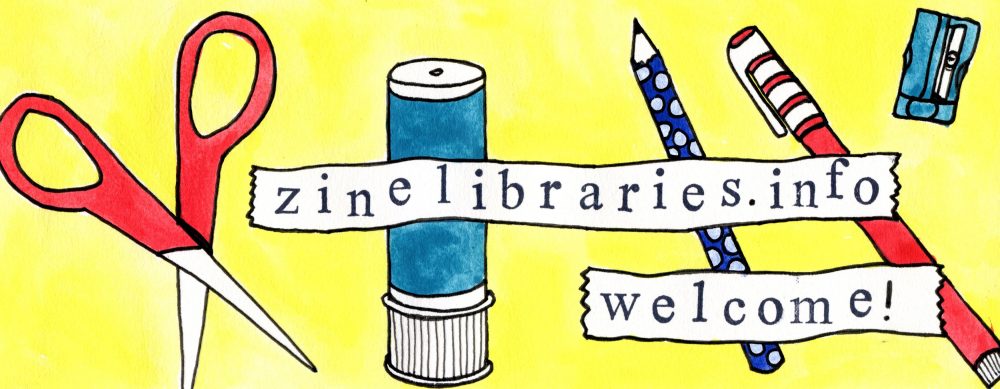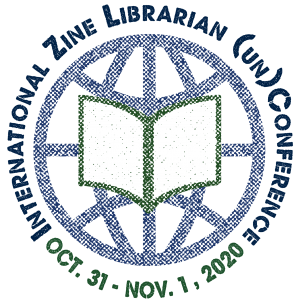Marya Errin Jones, Rhonda Kauffman, Kiyoshi Murakami, Ziba Zehdar
UTC – 2:00
Resources from Presenters:
Morning Zine Circle at Cafe Phalam in Kyoto
http://www.arsvi.com/w/mk02.htm
http://www.washingtoncenterforthebook.org/covid-19zine/
https://quarantinezineclub.neocities.org/
https://zines.barnard.edu/news/who-better-document-experience-everyone
https://view.joomag.com/our-stories-matter-life-in-the-time-of-covid-19-june-2020/0356379001591036473?short&
https://www.sherwoodforestzinelibrary.org/
https://glasgowzinelibrary.com/
https://www.portlandzinesymposium.org/
Session Notes:
Introductions:
Rhonda Kauffman is moderating this panel discussion about zine libraries and zine librarianship, hopes, dreams, etc. Rhonda is a cataloger and metadata management librarian at the University of Connecticut, and tries to start a zine collection wherever they go. Has been making zine since they were a kid. There a punk rock zine archival collection at the current library, and they donated their own personal collection of 90s punk zines to it.
Marya Erinn Jones is based in Albuquerque. Marya is a librarian for a 600-700 title zine collection hosted at the Tannex, a “room of requirement” like performance space she also runs. This is located in Barelas. Marya came to zines from friends and lovers, and is the founder of ABQ zine fest, 10 years ago.
Ziba Perez Zehdar currently works at the Los Angles public library and has run a circulating zine collection for the past three years there. Ziba had previously worked at the Long Beach public library, and founded a circulating zine circulating while there. First came across circulating zines at the library during a visit to the Salt Lake City Public Library in 2014 while doing other zine programming within the Orange County Public Library System. Loves zines and working with zines in the public library.
Kiyoshi Murakami‘s main research subject is the zines, anarchy, and demonstration movement. Visiting researcher at the Ritsumeikan University, Institute of Ars Vivendi in Kyoto and is a part time lecturer. He is a barefoot zine librarian, and since 2016 has organized a zine library. Missed a lot about where they work/connection to uni. Facilitator of the monthly Morning Zine Circle at Cafe Phalam in Kyoto – Nijo, Japan since October 2016. There, a small zine library is collected, consisting of zines donated by visiting zinesters, and articles about zine culture.
RK: How has your zine library affected your community?
KM: The zine library was made by the zine circle, ad has been run as a co-op. The zine circle is not composed of just zinesters, but has members who didn’t know about zines or DIY culture. has taught its community about DIY and zine culture. The zine circle library is not only a place for zines, but has acted as a communication hub and learning spot in the local community. 
ZPZ: LBPL has in partnership with LB zine fest collection. This draws in many visitors to the collection, and the library receives donated copies of zines people table there. LAPL tries to localize zinesters zines to their 73 local branches, trying to collect at a branch zines from zinesters in that neighborhood.
MEJ: Albuquerque had a very strong anarchist culture in the 90s, but it went underground. ABQ zine fest was founded 10 years ago, and the library was seeded from that, as well as submissions gather from other zine fests in the surrounding area. The zine library has been able to sometimes offer open hours, it varied seasonally, but had been able to open the collection for browsing before performances in the space. zine culture has helped the community blossom, in terms of communicating in a literary form. Zine fest happened last year out of the National Hispanic Cultural Center. Zine outreach, encouraging both people to come to the zine fest, as well as make their own zines, happens throughout the year. Its really important to get folks to create their own because their are so many stories that need to be told.
RK: An important part of community is getting people have a tactile experience, having a zine workshop or having folks get hands on with zines, learning about their use as a primary source, and then having them go to the archive and actually use them for research. Having sessions with different parts of the community, and letting them know what is around, and being able to speak their truth, can be pretty magical.
RK: We’ve been speaking a lot about zinefest, what is your connection to them?
ZPZ: One of the co-organizers of the Long Beach Zinefest. During the ZLuC which was hosted by the Long Beach Public Library there was a panel at the fest of zine librarians speaking. It was great to introduce the public to the library.
RK: Zines in times of strife? What role do zines play during times of social unrest? Do you have any special collections of zines that document social movements or zines that help people work through social movements?
MEJ: I’m not sure that you see the effects right away of the work you are doing, but several years ago in Sweden there was an incident after a womens march where women were attacked. Marya collected about 200 zines from all over and took them with her to Sweden to donate to the Stockholm library, where 6+ years later that collection still circulates today.
Zines have a shelf life, and don’t last forever in a circulating collection, but not after you’ve read them and put them somewhere inside your body, you will carry them with you. That’s the power of writing zines today, through the pain, that they might not have power in that moment, but it might ignite something later. Reading, sharing, and looking at zines is very inspiring.
KM: The collection contains zines relating to environmental, anti-base, desegregation, and other local grassroots movements. The zine circle usually discusses zines about these topics. Try and promote a strong connecting between zine culture and local grassroots organizing.
The most recent publication of the zine circle consisted of writing from five members which were edited together and posted online. Next month, they will collect again for the next issue.
ZPZ: Baldwin Hills Library has a weekly bilingual adult zine workshop, hosted by a non-profit called DSTL arts. They would have different topics, and library patrons contribute pages to it.
RK: BIPOC in zines and zine librarianship, what stories do you have? Both about being a librarian and collecting.
RK: Interesting intersection of roles between being a librarian of color, a person of color, zinester, and working in academia. Large movements happening right now about collection development and librarianship about embracing the values of diversity, inclusion, equity, and social justice. But talking the talk and walking the walk are very different things.
At her last institution, had applied for a grant to get collection off of the ground, 3 different times they tried to get it off the ground. Had a group of people who were excited about the project, but felt like while the institution said they wanted diverse, marginalized voices, when it came down to it, they didn’t want to deal with the collection, and acted in racist ways. These kinds of collections are an easy way to get access to marginalized voices, who don’t have a voice in major publishing streams.
MEJ: At many zinefest where she is one of only very few brown people there, or all the brown people end up grouped together at the same table. Founded ABQ Zinefest to try and change this. One of the only black women founding a zine fest. How can I be a part of a culture that doesn’t reflect me? Just because she writes a zine doesn’t make it a “black zine”. Population 3% black, 1% black female. She often has to look in the mirror to see another black woman. Tries to use the ABQ zine fest to broaden inclusion, getting people to write their zines and their stories.
There is a zine in being a black woman working from home. About how you live that life and how you get that life. Working from home has changed her life in a major way. Why its important to have flexibility as a person of color in your work life. Microaggressions and similar things build up, and take time to release. Learning how to wield her writer and zinester self at home. Zines are for transformation.
Albuquerque Zine library is a very feminist zine library, with lots of POC zines (although there always could be more). Figuring out how to grow that in this time take some time to figure out.
KM: Zine library has not have a BIPOC category. In japan there are different minorities in Japan, who have been discriminated against historically. The few zines that specialize about their issues. We have to realize the power that the majority has over the minority in our work.
ZPZ: In last 5 years as a zine librarian, has been collecting bilingual and foreign language zines. Has been buying spanish language zines in Mexico. Goes to Tijuana zine fest to collect as well. Once she went looking for zines in Cuba. She hopes to find zines in Farsi some day.
RK: Hopes and dreams for zine libraries?
MEJ: Accessible, in a multitude of languages, that stories that want to be told and need to be told are available to us. We need to take stock of our lives, realize that they are worth sharing, and document what is important.
Not having a zine fest in October to organize has left her wondering what to do, she has been looking at what other zine communities are doing right now to still move on and hopes for support to make something happen because we need something at this time. Embracing digital is new, but still wants to capture some of the tactileness even without touch. She hopes that future zine fest will be accessible to all of us.
RK: Loves the idea of college kids sharing, Has had professors bringing up zine programs, wanting to make zines as a part of class. What can digital zines become? Animations? What will the next iteration hold? Record those voices not being heard otherwise or being shut out of conversation.
KM: Cooperation between zine libraries within Japan. Further, expanding the network to Asia. Japan zine scene weak links to grassroots and radical networks in Asia, and wants to grow and strengthen those connections.
ZPZ: A public zine collection for every public library. Online browseable zine catalogs. More partnerships between zine fests and zine libraries!
Q&A: What are folks doing in their zine communities to maintain it during this time?
RK: Has had zooms groups to do show and tell of crafts, knitting groups, could use this approach to have people show off their zine areas.
MJ: Hasn’t been having virtual programs, this time has been a time of recovery. But has been meeting weekly with zine fest co organizer weekly. Wants to figure it out, and feels like it has to be through zoom.
Z: Has attended Portland zine symp has a zoom event, has attended a number of events. Recently with Liz Yerby and it had a series of illustration prompts and folks shared their artwork.
RK: Thank you for speaking about zine libraries!
































